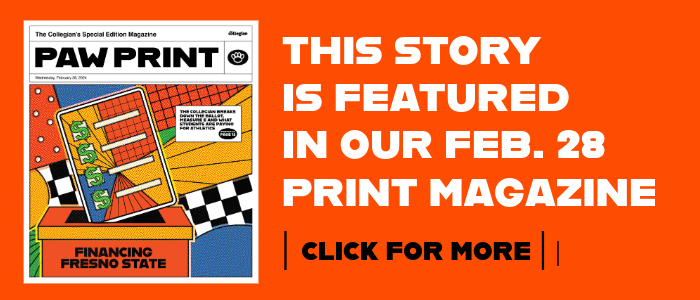Measure E is on the ballot again, proposing to raise funds to address Fresno State concerns like clean water, asbestos and develop new projects within a 2-mile “improvement zone.”
The 2022 iteration of the measure would have been a 0.2% sales tax in Fresno County and could have generated Fresno State around $36 million annually for 20 years for a total of $720 million. The measure needed a simple majority vote to pass, but 52.86% of Fresno County voters rejected the measure while 47.14% voted “YES.”
The new iteration of Measure E would impose a one cent sales tax (a 0.25% sales tax) on a $4 purchase in Fresno County. Backers of the tax measure say it will generate around $1.6 billion for Fresno State over a 25-year period. Proponents have come up with a long list of proposed projects, including a new concert hall, a new concert hall and stadium renovation.
The 2024 iteration is a $28 million a year increase in revenue compared to the 2022 version of the measure. Here’s what to know about the measure.
There are no set phases or specific projects that are binding in the measure.
It states that the passing of the measure will include “…expanding access in nursing, agriculture, criminology, science, engineering and other fields…”
“So when you look at the list, the list is a draft,” said Fresno State President Saúl Jiménez-Sandoval during an interview with The Collegian. “The Measure E committee asked us, Fresno State, ‘If you had $1.5 billion, what would be the most pressing needs that you would address with this money?’ ”
In a “Yes on Measure E” television commercial, Mayor Jerry Dyer states:
“Measure E will provide the funding to triple or quadruple the number of nurses who graduate from Fresno State.”
However, Miguel Arias, Fresno State alum and councilmember for District 3, told The Collegian that it does not work that way.
He said that the state determines how much operational money the university receives to accommodate students and faculty.
“So the amount of nursing students or police officers that Fresno State generates would not grow based on passage of this additional local tax measure,” Arias said. “It would simply give them nicer buildings. The only thing that would grow as a result of this measure is profits by local contractors who are funding this measure and the facilities for the athletic program under this measure, and it would eliminate the state of California’s commitment to fund future projects at Fresno State.”
Water and asbestos are mentioned.
Another part of the measure focuses on “…providing safe drinking water; removing asbestos, lead paint and mold…”
Providing clean drinking water is also mentioned in the same Dyer television advertisement.
Jiménez-Sandoval said drinking water is currently safe on campus. If there was knowledge of unsafe water, he said, reusable water bottles on campus wouldn’t be encouraged.
There are 35 water bottle fill-up stations on campus. The water that is used for the refill stations comes from three different wells located on campus that pump groundwater.
Kenneth Schmidt, hydrogeologist and Fresno State alum, has worked with Fresno State before by consulting on older wells. He assessed the list of contaminants with The Collegian and confirmed that the water is safe to drink.
The maximum level allowed (MCL) is the scale that is used to determine the amount of contaminants in the water. If it goes above, that would be cause for concern and would have to shut the well down immediately.
“For nitrate as nitrogen the MCL is 10 and the value is 2.8, so it’s way below the 10,” Schmidt said.
Lauren Nickerson, associate vice president of University Communications, said that the water reference in the commercials was more about continuing to ensure that Fresno State has safe drinking water and adequate domestic wells.
According to Jiménez-Sandoval, 77% of the buildings at Fresno State are more than 30 years old while 62% are more than 60 years old.
The Vote Yes on Measure E advertisements have also highlighted such projects as removing asbestos. In an interview, The Collegian asked Jiménez-Sandoval if the campus had any asbestos in classrooms.
“The thing is that we do have asbestos, but it’s contained,” Jiménez-Sandoval said.
Jiménez-Sandoval explained how asbestos becomes activated due to shaking or disruption by construction, and explained that the current construction going on throughout campus does not put any of the campus community at harm.
“Whenever we know that there’s asbestos in the construction that happens, we seal off the room, like literally seal that off, and then we remove it safely,” Jiménez-Sandoval said.
What is the two-mile radius?
The measure also includes something called the “improvement zone.”
This would be bounded by a 2-mile radius around the campus’ physical boundaries and similar boundaries around any additional locations within Fresno County. These locations may be owned or leased during the time of the ordinance by the California State University, according to the full text of the measure.
So what would be built within that 2-mile radius?
Jiménez-Sandoval said that the answer to that would be dorms and additional parking that would remain affordable for students.
He shared that they would have to build a significant amount of dorm spaces at an affordable price to accommodate through the rise of rental rates.
Yet, within the proximity of the 2-miles there are not many empty plots of land available for housing developments.
“They’re [plots of land] not empty. They don’t have to be empty,” Jiménez-Sandoval said.
When asked if Fresno State could buy a strip mall and convert that to dorms he said: “That’s right.”
Arias shared his thoughts regarding the 2-mile radius, saying that it would be money in the pockets of developers.
Proponents say there will be three levels of oversight.
Jiménez-Sandoval said that there would be a tier level in place to decide how the funds are distributed. The first group would be comprised of 16 or 17 students, faculty, staff and possibly some community members; the second would be the oversight committee appointed by the county Board of Supervisors; and the third would be the Board of Supervisors itself.
The first group is not written into the measure and is “optional,” Arias said.
The oversight committee will be required to meet four times a year and is made up of seven appointed members. The Fresno County Board of Supervisors will appoint five, Fresno State’s office of the chancellor will appoint one and the office of the university president will appoint one.
“On an annual basis, up to 1% of the proceeds of the tax deposited in the Fund shall be appropriated to the County for the costs of administering the provisions of this Chapter, including County staffing or staffing retained by the Citizens’ Oversight Committee and other related administrative costs,” the measure states.
That would accumulate to a minimum of $80,000 annually for the oversight committee, which for 25 years would be around $2 million. For reference, the members of Measure Z, the Fresno Chaffee Zoo sales tax oversight committee, meet twice a month and get paid $0.
Jim Patterson, assemblymember for District 8, is speculated to be promised a position on the Citizens’ Oversight Committee, according to Arias.
“In 14 years, Jim [Patterson] has not brought one penny to Fresno State. So he wants us to bail him out by passing a sales tax. Jim Patterson has been promised an appointment to the committee that would pay him $80,000 for the next 25 years, if this tax passes. It’s self interest,” Arias said.
When asked to confirm or comment on the alleged promised position Assemblyman Patterson’s district office said:
“That would be an elected issue. That’s not anything as long as we are his legislative office and we handle the day to day legislative affairs. We could not comment on that one way or the other.”
What about athletics?
Fresno State Athletics would also take a chunk from the Measure E funds. In the list of projects, there are nine different projects related to athletics, coming out to $240 million.
The money would partly fund projects that are similar to those in the Elevate campaign, which was introduced early last year.
The Collegian talked to Fresno State Athletic Director Terry Tumey in May regarding the campaign. He was asked about Measure E and shared that the university cannot endorse it.
“You have to always be careful about Measure E from our vantage point because we can’t endorse Measure E right? As an institution, we can’t,” Tumey said.
15% of the $1.5 billion would go toward athletics.
Split views?
Manjot Dhanda, a senior majoring in electrical engineering, said that the university does need some major improvements but doesn’t think a sales tax is the way to go.
“I feel like raising taxes, especially for college students, is extremely unfair,” Dhanda said. “Most college students devote most of their time to school, which results in little to no room for working or for themselves.”
Tim Orman, campaign consultant and former chief of staff to former Mayor Lee Brand and Mayor Jerry Dyer, shared in an interview with The Collegian how construction on campus, such as deferred maintenance, would benefit from this.
“Measure E will provide Fresno State with consistent and stable funding for deferred maintenance, health and safety repairs and capital construction. Which should improve planning and avoid most of the issues associated with the current campus construction,” Orman said.
Whether you are voting “YES” or “NO” voters all around the county will decide on Measure E on Tuesday, March 5.






